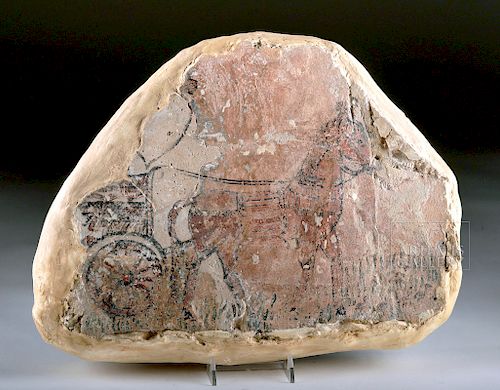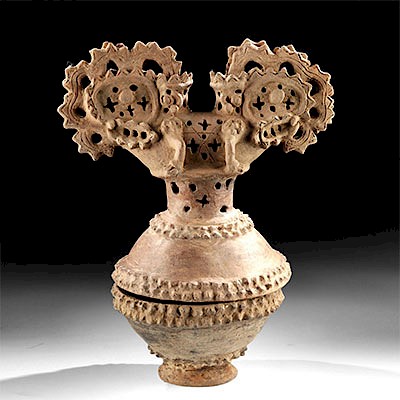Extremely Rare Mesopotamian Polychrome Relief
Lot 38f
About Seller
Artemis Fine Arts
686 S Taylor Ave, Ste 106
Louisville, CO 80027
United States
Selling antiquities, ancient and ethnographic art online since 1993, Artemis Gallery specializes in Classical Antiquities (Egyptian, Greek, Roman, Near Eastern), Asian, Pre-Columbian, African / Tribal / Oceanographic art. Our extensive inventory includes pottery, stone, metal, wood, glass and textil...Read more
Categories
Estimate:
$22,000 - $33,000
Absentee vs Live bid
Two ways to bid:
- Leave a max absentee bid and the platform will bid on your behalf up to your maximum bid during the live auction.
- Bid live during the auction and your bids will be submitted real-time to the auctioneer.
Bid Increments
| Price | Bid Increment |
|---|---|
| $0 | $25 |
| $300 | $50 |
| $1,000 | $100 |
| $2,000 | $250 |
| $5,000 | $500 |
| $10,000 | $1,000 |
| $20,000 | $2,500 |
| $50,000 | $5,000 |
| $100,000 | $10,000 |
| $200,000 | $20,000 |
About Auction
By Artemis Fine Arts
Aug 22, 2019
Set Reminder
2019-08-22 10:00:00
2019-08-22 10:00:00
America/New_York
Bidsquare
Bidsquare : Fine Ancient | Asian | Ethnographic Art
https://www.bidsquare.com/auctions/artemis-gallery/fine-ancient-asian-ethnographic-art-4348
Featuring classical antiquities, ancient and ethnographic art from cultures encompassing the globe, plus fine art. Egyptian, Greek, Roman, Etruscan, Near Eastern, Asian, Pre-Columbian, Native American, African / Tribal, Oceanic, Spanish Colonial, Russian, Fine Art, so much more! Artemis Fine Arts info@artemisgallery.com
Featuring classical antiquities, ancient and ethnographic art from cultures encompassing the globe, plus fine art. Egyptian, Greek, Roman, Etruscan, Near Eastern, Asian, Pre-Columbian, Native American, African / Tribal, Oceanic, Spanish Colonial, Russian, Fine Art, so much more! Artemis Fine Arts info@artemisgallery.com
- Lot Description
Ancient Near East, Mesopotamian, ca. 2400 to 600 BCE (toward the earlier years of this period). Given that very little painting from Mesopotamia has survived the tests of time, this section of a painted fresco is incredibly rare. The composition presents a horse pulling a chariot, with the front wheel and cart nicely detailed. In addition, one can see the reins leading to the horse as well as a human hand grasping a stretched archery bow above. The horse is beautifully groomed and probably belonged to a noble personage or elite warrior. Notice the horse's fancy saddle with a striated pattern, his twisted or possibly plaited mane and tail, and the chevron-like motifs adorning his trappings. The artist also cared to indicate a sense of space, as a groundline is denoted by a grassy field. All is outlined in black with a steady, skilled hand. Russet red-brown pigment remains on the horse's body, saddle, cart, and wheel AND blue-green pigment remains on the blades of grass. Size: 14.375" W x 10.75" H (36.5 cm x 27.3 cm)
Interestingly, the fine black lines used to outline the forms conjure those of the fresco depicting a sacrifice from the Palace of Zimrilin from Mari at the Getty (https://www.gettyimages.com/detail/news-photo/fresco-depicting-a-sacrifice-from-mari-archeological-site-news-photo/142931278). Frescoes with figural imagery were discovered in five rooms of the Palace of Mari, but restorers could only reassemble four of those compositions, because so much damage was done by Hammurabi of Babylon's sacking of Mari in ca. 2760 BCE.
Provenance: private Vero Beach, Florida, USA collection; acquired in Paris, France from an old French collection between 1977 and 1987
All items legal to buy/sell under U.S. Statute covering cultural patrimony Code 2600, CHAPTER 14, and are guaranteed to be as described or your money back.
A Certificate of Authenticity will accompany all winning bids.
We ship worldwide and handle all shipping in-house for your convenience.
#143700A fragment from a larger fresco. As visible on the reverse, the fresco was stabilized from several pieces in the early 2000s by Nelson C. Dale of Restoration Services in Boston. Normal surface wear with some losses to pigment and divots/losses to fresco material as shown, but much remains with legible imagery as shown.Condition
- Shipping Info
-
All shipping is handled in-house for your convenience. Your invoice from Artemis Gallery will include shipping calculation instructions. If in doubt, please inquire BEFORE bidding for estimated shipping costs for individual items.
-
- Buyer's Premium



 EUR
EUR CAD
CAD AUD
AUD GBP
GBP MXN
MXN HKD
HKD CNY
CNY MYR
MYR SEK
SEK SGD
SGD CHF
CHF THB
THB














